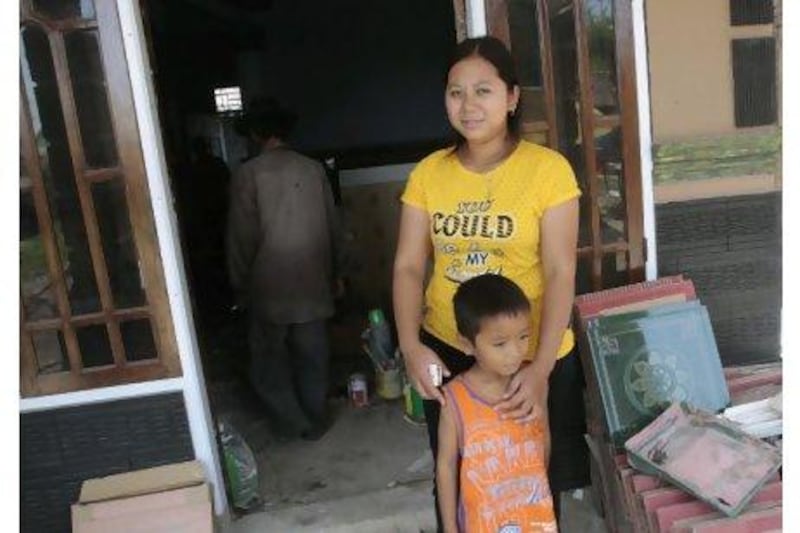TRUNGTUM // An Indonesian maid is beheaded in Saudi Arabia. When a second one is on death row, strangers at home rally to her cause and raise tens of thousands of dollars.
She not only escapes the sword but is now rich. And hated.
Darsem binti Dawud Tawar, 22, shot to fame earlier this year in Indonesia after spending more than three years in a Saudi prison accused of killing a man who allegedly tried to rape her.
But when she safely returned to her small fishing village, the public tide swiftly turned against her.
She is accused of living in luxury, building a fancy house along the dusty track that passes for Main Street, throwing around cash and draping herself in jewels.
"She acts like a bling-bling celebrity now," said Siti Patonah, a 32-year-old vendor, scrubbing apples and watermelons at a market.
The execution in June of a 53-year-old grandmother, Ruyati binti Satubim, sparked mass protests in Indonesia and prompted the government's first effort to do more to protect the 1.2 million women who flock to Saudi Arabia every year. It recalled its ambassador from Riyadh and last month barred workers from going to the kingdom.
But Ms Darsem's case has stolen the show, sparking fierce debate in the world's most populous Muslim nation about whether she should donate her windfall.
Some Indonesian lawmakers fret that the public may not be as likely to give next time around, even if a life is at stake.
Life has been anything but easy for Ms Darsem. She dropped out of school before finishing and moved to Jakarta so she could help support her family.
By 15, she was married and pregnant and months later she went to the Middle East, first Oman, then the UAE and finally Saudi Arabia, as she had seen many other young women do before her.
"My husband didn't have a job, my father was getting old, I thought it was our best chance," Ms Darsem said from the living room of her parent's two-room house, aqua-blue paint chipping off the walls.
She refuses to talk about what happened next, saying she wants to put it behind her.
But Saudi media reports say she killed her employer's relative, a man who was mentally ill, with a hammer to the head after he attacked her. She then threw his body in an empty water tank and covered it with concrete.
Ms Darsem spent three-and-a-half years in a Saudi jail but it was not until the beheading of Ruyati, also accused of murdering an abusive boss, that her luck turned.
Newspapers and activists on Facebook and Twitter championed her cause. The government quickly scraped together the US$500,000 (Dh1.8 million) demanded by the family of her victim for her release.
The public also chipped in and when she finally came home a TV station handed her $140,000 from its viewers. That is a fortune in this nation of 240 million, where many people make less than $200 a month. In Trungtum, a coastal town 180 kilometres from Jakarta, Ms Darsem may as well be a millionaire.
She said everyone has a suggestion as to how she should spend the money, and they all have their hands out. "But why should I give them anything? They did nothing to help my family when I was gone," she said of her neighbours.
Asked why she does not help with the legal fees of 23 Indonesians still on death row in Saudi Arabia - the most popular suggestion on Twitter and in newspaper opinion pages - the round-faced girl with dark, slow-blinking eyes looks incredulous.
"I didn't even know those women," said Ms Darsem. "There were dozens in my cell all the time. They were always coming and going. But really, who are they to me?"
Despite the rumours, Ms Darsem is hardly living large. The $10,000 (Dh37,000) house she is building 50 metres from her parents' home is not much bigger or more extravagant than any of her neighbours' properties and her future plans are modest: some land to grow rice, a new, wooden fishing boat for her dad and a sewing machine to open a tailor's shop.
She also intends to get "a good education for my son".
The local TV station that collected the money on Ms Darsem's behalf has taken much of the heat.
Many viewers thought they were saving the girl from the executioner's sword but the government insisted it was responsible for the "blood money" demanded by the victim's family.
So the station decided to give it to Ms Darsem. Standing awkwardly beside her as she accepted the cash was Een Nuraini, the daughter of the woman who was beheaded.
"I don't know why they even invited me," said Ms Nuraini, 35, who lives in Sukatani, a small village a few hours from Trungtum.
"But when Darsem promised on live TV to share some of the money, I hoped to be able to use it to send my mother's parents to Mecca for the Haj pilgrimage."
Several weeks later, Ms Darsem presented Ms Nuraini with an envelope containing $2,000. It was nowhere near enough for her grandparents' trip.
"I don't think she understands," said Ms Nuraini, her eyes welling with tears from beneath her dark grey headscarf.
"The only reason she got all this attention - not just the money but also help from the government - was because of my mother."
Ms Nuraini said no one has supported her family - neither the government, nor the public.
Asked what she would do with Ms Darsem's money, she said: "I gave it all to the mosque and orphanage in my mum's name. That's what she would have wanted."





